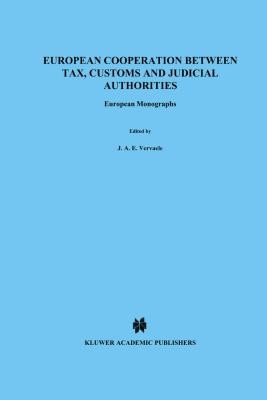
- We will send in 10–14 business days.
- Author: John A E Vervaele
- Publisher: Kluwer Law International
- Year: 2001
- Pages: 312
- ISBN-10: 9041117474
- ISBN-13: 9789041117472
- Format: 16.7 x 24.7 x 2.4 cm, hardcover
- Language: English
- SAVE -10% with code: EXTRA
European Cooperation Between Tax, Customs and Judicial Authorties (e-book) (used book) | bookbook.eu
Reviews
Description
This book offers an English translation, updated to mid-2001, of an acclaimed Dutch study which appeared earlier that year. The study was originally commissioned by the Dutch Ministry of Justice, which recognized that the way to clear standards of cooperation lay through in-depth comparative research into the relevant law, practice, and recent experience of several major national jurisdictions. A five-member research group worked with the help of the Willem Pompe Institute of Criminal Law and Criminology, the Foundation for the Promotion of Criminal Law Research, and the Utrecht Faculty of Law's Centre for Enforcement of European Law. In order to focus meaningfully on the theme of combating fraud in its most significant current manifestations, the researchers restricted their study to customs law, fiscal law, and agricultural law in four EC countries. Among the core legal matters investigated are the following: exchange of enforcement data; performance of acts of investigation; the "moment" in each legal system at which it is necessary to switch from administrative assistance to assistance in criminal matters; and the manner in which national systems of evidence deal with evidence from abroad. Based on a close study of legislation and case law in each of the four countries-in addition to numerous personal interviews-the analysis clearly identifies the legal problems, and makes recommendations as to how transnational administrative law and cooperation in criminal matters may be most effectively arranged.
EXTRA 10 % discount with code: EXTRA
The promotion ends in 21d.00:30:14
The discount code is valid when purchasing from 10 €. Discounts do not stack.
- Author: John A E Vervaele
- Publisher: Kluwer Law International
- Year: 2001
- Pages: 312
- ISBN-10: 9041117474
- ISBN-13: 9789041117472
- Format: 16.7 x 24.7 x 2.4 cm, hardcover
- Language: English English
This book offers an English translation, updated to mid-2001, of an acclaimed Dutch study which appeared earlier that year. The study was originally commissioned by the Dutch Ministry of Justice, which recognized that the way to clear standards of cooperation lay through in-depth comparative research into the relevant law, practice, and recent experience of several major national jurisdictions. A five-member research group worked with the help of the Willem Pompe Institute of Criminal Law and Criminology, the Foundation for the Promotion of Criminal Law Research, and the Utrecht Faculty of Law's Centre for Enforcement of European Law. In order to focus meaningfully on the theme of combating fraud in its most significant current manifestations, the researchers restricted their study to customs law, fiscal law, and agricultural law in four EC countries. Among the core legal matters investigated are the following: exchange of enforcement data; performance of acts of investigation; the "moment" in each legal system at which it is necessary to switch from administrative assistance to assistance in criminal matters; and the manner in which national systems of evidence deal with evidence from abroad. Based on a close study of legislation and case law in each of the four countries-in addition to numerous personal interviews-the analysis clearly identifies the legal problems, and makes recommendations as to how transnational administrative law and cooperation in criminal matters may be most effectively arranged.


Reviews